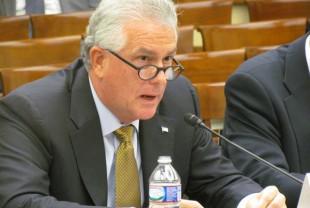Executive Director of Energy and Environment Initiative testifies on Capitol Hill
Charles McConnell, executive director of Rice’s Energy and Environment Initiative, testified on Capitol Hill Oct. 29 about the need for continued federal funding to develop and demonstrate carbon-capture utilization and storage (CCUS) technology for power plants.
McConnell, a 35-year veteran of the energy industry, testified before the U.S. House Subcommittee on Energy and the Subcommittee on Environment at a hearing titled “EPA Power Plant Regulations and New Source Performance Standards for CO2 Emissions: Is the Technology Demonstrated and Ready?”

Charles McConnell, executive director of Rice's Energy and Environment Initiative, testified on Capitol Hill Oct. 29 about carbon-capture technology.
McConnell joined Rice in August after serving two years as assistant secretary of energy at the Department of Energy (DOE). While at DOE, he was responsible for the strategic policy leadership, budgets, project management, and research and development of the department’s coal, oil and gas and advanced technologies programs, as well as for the operations and management of the U.S. Strategic Petroleum Reserve and the National Energy Technologies Laboratories.
McConnell told the House subcommittee that technologies for carbon capture and storage (CCS) and for CCUS are critically important to the U.S. In CCUS, carbon dioxide that is captured from fossil-fueled power plants is injected into oil wells to enhance oil production. The carbon dioxide improves the flow of oil and can be safely stored underground permanently.
McConnell told lawmakers that CCUS “is necessary to ensure a diversified, sustainable domestic energy portfolio for energy security. It also helps minimize future rapid escalations in electricity prices by enabling a real ‘all of the above’ energy portfolio that includes our most abundant domestic resources — clean fossil energy from coal, oil and natural gas.”
McConnell said CCUS technology is also necessary for electricity producers to meet new EPA standards for reducing greenhouse gas emissions. But he said the technology was not ready for commercial implementation, in part because budgets for developing and testing the technology have been cut repeatedly in recent years.
“The DOE’s coal research-and-development funding levels must, at the very least, be restored to 2010 funding levels to enable the deployment of demonstration projects to progress transformational, low-cost CCUS technology from the laboratory to the commercial marketplace in a timely manner,” he said.
McConnell told the committee that an additional $100 million per year directed at low-cost, transformational CCUS would restore funding levels and could enable the demonstration of commercially viable CO2 capture technology within 10 years.
“While a considerable amount of technical risk would be required to undertake a program with this short of a schedule, it can be done,” he said. “This R&D is critical to success because the technology is not ready today.”
For more information about Rice’s Energy and Environment Initiative, visit e2i.rice.edu.


Leave a Reply